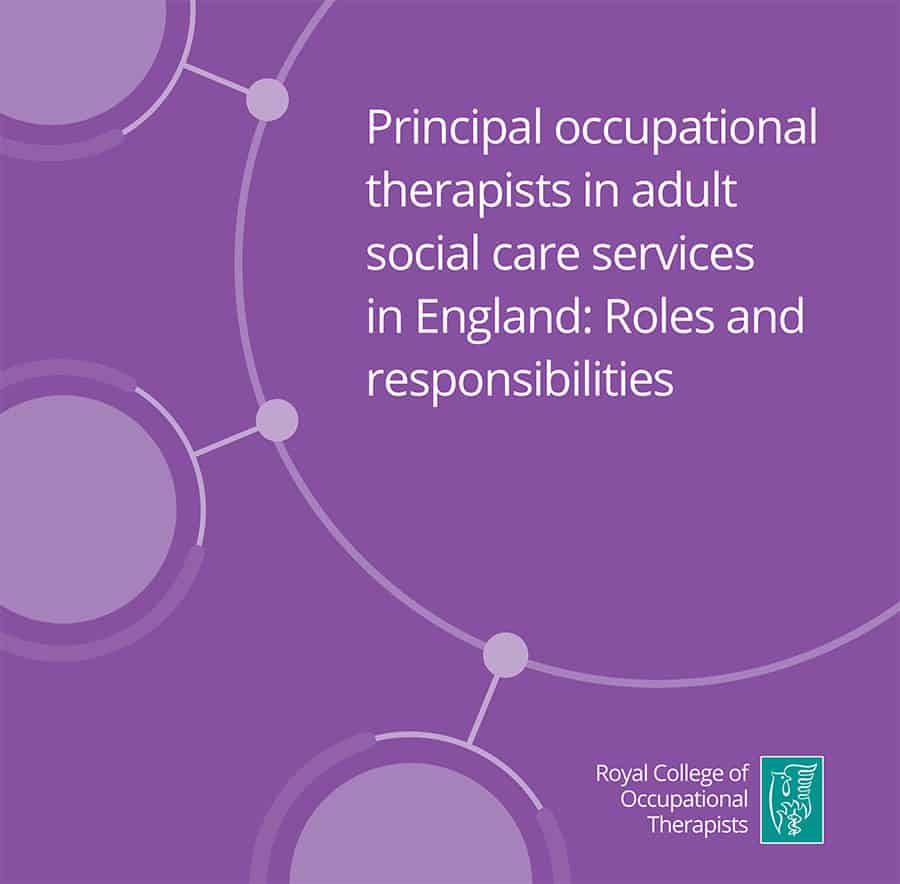Latest RCOT guide discusses role principal OTs play at strategic levels in adult social care services in England

The Royal College of Occupational Therapists (RCOT) has published new guidance on the roles and responsibilities of principal occupational therapists (OTs) in adult social care services in England.
Endorsed by Skills for Care, the guidance is supported by the Chief Allied Health Professions Officer for England, Chief Social Worker for Adults for England and the Association of Directors of Adult Social Services (ADASS) in England.
Prompted by an awareness of the importance that lead OTs play at strategic levels, this guidance provides a capability statement to be used as a foundation to bring consistency to job role planning across England.
It can also be used to:
- Demonstrate the role of the principal OT, support the development of new principal roles and amplify the important part occupational therapists have within social care.
- Highlight how principal OTs can work alongside principal social workers and directors of adult social care to provide collaborative, person-centred, inclusive, and effective services.
- Align the roles and responsibilities of principal OTs with the four Pillars of Practice as set out in the RCOT Career Development Framework.
According to NHS Employers, principal occupational therapists act as the clinical lead for their specialist service; lead in the development of their own specialist service; lead clinical audit, which may include undertaking research; and assess and treat own specialist caseload of clients in a variety of settings.
The guide says that the last few years have seen a significant increase in the number of principal OTs working within social care teams in England.
Commenting on the report, RCOT Chief Executive, Steve Ford said: “We know that despite the small percentage of occupational therapists based within adult social care in England, they are responsible for a high proportion of work and are essential in delivering key aspects of the Care Act.
“As leaders within social care, principal occupational therapists can articulate to others the valuable role the profession holds working alongside their principal social work colleagues. Their role as strategic leaders plays a vital part in bridging the gap between health and care that is so important to best meet the needs of people in receipt of services.”
Click here to download RCOT’s latest guide: ‘Principal occupational therapists in adult social care services in England: Roles and responsibilities’
RCOT highlights many different roles and responsibilities of principal OTs within the document.
Importantly, the guide says that principal OTs should: “Advise on the procurement and appropriate usage of assistive technology and equipment for people who access services, and to support colleagues to complete their roles. For example, provide professional oversight and a strategic lead in relation to equipment contracts within the local authority, ensuring the right service is commissioned to meet community needs and that best use is made of public money.”
The college underlines that principal OTs must always listen to, and reflect on, the needs and views of people who access services, their families and their carers to facilitate shared ownership of decision making.
They should also always apply advanced and extensive knowledge of and skills in assessment, intervention and evaluation for people with directly or indirectly highly complex health and social care needs, to promote a personalised approach, risk reduction, wellbeing and prevention agendas.
“As a strategic lead for occupational therapy, influence and engage with the wider social care and health systems,” RCOT adds.
Principal OTs should further embed a wider system that takes all possible steps to empower local people to prevent, reduce or delay the need for care and support, according to the document.
In addition, principal OTs are advised to develop and evaluate educational resources for and with a wide range of audiences (e.g. learners, people who access services, their families and their carers, occupational therapists, social workers, administrators) using appropriate, efficient, accessible and innovative methods of delivery.
Earlier this year, RCOT Chief Executive Steve Ford said that the introduction of the Health and Social Care Levy from April 2022 will provide relief for some people, but the lack of guarantee of sustainable long-term funding beyond this is a “big concern”.

